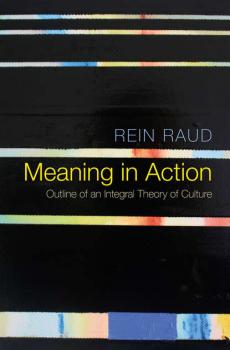ТОП просматриваемых книг сайта:















Rein Raud
Список книг автора Rein RaudАннотация
Reality exists independently of human observers, but does the same apply to its structure? Realist ontologies usually assume so: according to them, the world consists of objects, these have properties and enter into relations with each other, more or less as we are accustomed to think of them. Against this view, Rein Raud develops a radical process ontology that does not credit any vantage point, any scale or speed of being, any range of cognitive faculties with the privilege to judge how the world ‘really’ is. In his view, what we think of as objects are recast as fields of constitutive tensions, cross-sections of processes, never in complete balance but always striving for it and always reconfiguring themselves accordingly. The human self is also understood as a fluctuating field, not limited to the mind but distributed all over the body and reaching out into its environment, with different constituents of the process constantly vying for control. The need for such a process philosophy has often been voiced, but rarely has there been an effort to develop it in a systematic and rigourous manner that leads to original accounts of identity, continuity, time, change, causality, agency and other topics. Throughout his new book, Raud engages with an unusually broad range of philosophical schools and debates, from New Materialism and Object-Oriented Ontology to both phenomenological and analytical philosophy of mind, from feminist philosophy of science to neurophilosophy and social ontology. Being in Flux will be of interest to students and scholars in philosophy and the humanities generally and to anyone interested in current debates about realism, materialism and ontology.
Аннотация
In this important new book Rein Raud develops an original theory of culture understood as a loose and internally contradictory system of texts and practices that are shared by intermittent groups of people and used by them to make sense of their life-worlds. This theory views culture simultaneously in two ways: as a world of texts, tangible and shareable products of signifying acts, and as a space of practices, repeatable activities that produce, disseminate and interpret these clusters of meaning. Both approaches are developed into corresponding models of culture which, used together, are able to provide a rich understanding of any meaning in action. In developing this innovative theory, Raud draws on a wide range of disciplines, from anthropology, sociology and cultural studies to semiotics and philosophy. The theory is illustrated throughout with examples drawn from both 'high' and popular culture, and from Western and Asian traditions, dealing with both contemporary and historical topics. The book concludes with two case studies from very different contexts – one dealing with Italian poetry in the 13th century, the other dealing with the art scene in Eastern Europe in the 1990s. This timely and original work makes a major new contribution to the theory of culture and will be welcomed by students and scholars throughout the social sciences and humanities.
Аннотация
Raamatu minajutustajat Enn Padrikut kohtame hetkel, kui ta on kuus kuud tagasi teada saanud, et tal on ravimatu vähk ja väga vähe jäänud elada. Vahepealse aja jooksul on ta ette võtnud ülesande, mida on aastaid edasi lükanud: välja selgitada, miks ikkagi sooritas tema tütar Anni boheemlaste kommuunis koos kolme teise noore inimesega kollektiivse enesetapu, sooviga ilmuda Jumala palge ette. Sündmuste jälgi ajades on Enn otsinud üles Anni omaaegsed tuttavad ja sõbrad, suhelnud kommuunist varem lahkunud inimestega ja käinud isegi Prantsusmaal, kus Anni mõnda aega elas ja õppis. Kõigest sellest kokku joonistubki talle pilt, mis kujuneb ometi ootamatuks ja hirmsamaks kui ta oleks arvanud osata. Autor on ülikoolis töötades ja tudengitega suheldes näinud pealt päris paljude noorte inimeste eneseotsinguid ja postmodernses tegelikkuses sageli rahulduseta jäävat igatsust millegi kindla ja absoluutse järele. Raamat on lugu sellest, mis võib juhtuda, kui niisugune igatsus põimub inimlike ambitsioonidega ja pääseb kontrolli alt välja.
Loeb Tambet Tuisk.
Loeb Tambet Tuisk.
Аннотация
Winner of the Eduard Vilde Literary Award[/b] The Brother opens with a mysterious stranger arriving in a small town controlled by a group of men—men who recently cheated the stranger's supposed sister out of her inheritance and mother's estate. Resigned to giving up on her dreams and ambitions, Laila took this swindling in stride, something that Brother won't stand for. Soon after his arrival, fortunes change dramatically, enraging this group of powerful men, motivating them to get their revenge on Brother. Meanwhile, a rat-faced paralegal makes it his mission to discover Brother's true identity . . . The first novel of Rein Raud's to appear in English, The Brother is, in Raud's own words, a spaghetti western told in poetic prose, simultaneously paying tribute to both Clint Eastwood and Alessandro Baricco. With its well-drawn characters and quick moving plot, it takes on more mythic aspects, lightly touching on philosophical ideas of identity and the ruthless way the world is divided into winners and losers. Rein Raud is the author of four books of poetry, six novels, and several collections of short fiction. He's also a scholar in Japanese studies and has translated several works of Japanese into Estonian. One of his short pieces appeared in Best European Fiction 2015. Adam Cullen was born and educated in Minneapolis, Minnesota, but currently resides in Tallinn where he's translated dozens of plays, stories, and poems. He's also translated three published novels, including Radio by Tõnu Õnnepalu and The Cavemen Chronicle by Mihkel Mutt.
Аннотация
Lühiproosat 1993. aastast
Аннотация
Lühiproosat 1994. aastast
Аннотация
Peaministri jõhkra tapmise jälgi ajades satub uuriv ajakirjanik Kairit Nõlvak ruttu palju suurema saladuste puntra otsa – ja taipab ühtlasi, et sama pundart püüab temaga võidu lahti harutada ka keegi teine, temast palju võimsam… “Viimane kustutab tule” on ulmeliste sugemetega poliitiline thriller ning samas ka romaan võimust ja vastutusest, vassimisest ja usaldusest. Eeskätt aga sellest, mille kõigega võivad inimesed oma põhimõtete kaitsel endalegi ootamatult hakkama saada.










